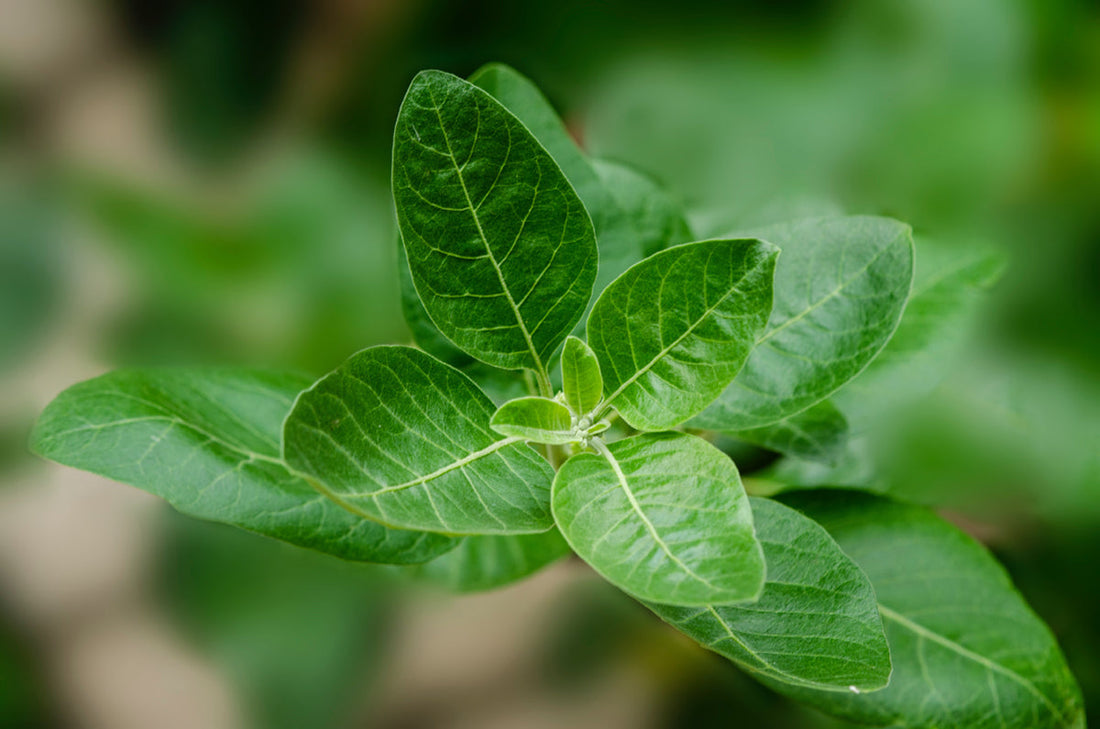Ashwgandha benefits
Ashwagandha, or Withania somnifera, can be interpreted as “the smell or the strength of a horse” in Sanskrit. This plant that has been used for thousands of years in Ayurvedic medicine — a system of healing the body that originated in India more than 5,000 years ago. The root of the Withania somnifera plant is specially sought after for its powerful bioactive compounds, which may support many of the body’s functions.
Ashwagandha falls into a class of plants referred to as “adaptogens” that seem to increase the body’s resilience to stress. Ashwagandha contains several phytonutrients and compounds, like withanolides, that interact uniquely with the body. These various compounds allow ashwagandha to be used as an adaptogenic herb that supports health by calming the brain, reducing inflammation, lowering blood sugar and pressure or stimulating the immune system.
Is ashwagandha effective for stress and anxiety relief?
Stress can mean many things and stem from many triggers, but when you consider stress in the body, you’ll find a series of physiological responses that increase the production of hormones like cortisol and adrenaline. These hormones signal to the body that it is in a “fight or flight” mode. While the response was beneficial to our ancestors who used this highly activated state to flee predators, the stress we experience in modern times is often related to work, familial, or societal pressure and does not pose a serious threat to our safety. The dysregulation of these stress hormones can lead to several issues like weight gain, sleep problems, high blood pressure, risk of heart disease, and mental health problems like anxiety.1, 2, 3, 4 Women in particular face higher risks when it comes to conditions that can be caused or aggravated by stress, such as autoimmune diseases, chronic pain, and anxiety disorders.5
Despite ashwagandha’s long track record of success, it has only recently received mainstream attention in western culture and media. This is because an increasing number of studies are supporting a link to stress and anxiety relief through ashwagandha supplementation. Though more studies are needed to explain ashwagandha’s effect on lowering stressors in the human body, studies have shown ashwagandha can reduce cortisol levels.6,7 Ashwangandha may achieve this reduction in cortisol by providing neurotransmitters to restore balance and reduce oxidative stress and inflammation.8
Controlled human studies looking more closely at individuals with chronic stress or anxiety disorders found that individuals who supplemented with ashwagandha were 60% more likely to report a reduction in anxiety and insomnia.7 Another study achieved statistically significant reductions in 88% of individuals with anxiety after 6 weeks of ashwagandha supplementation, all while avoiding the negative side effects of common antianxiety medications.9
As the attention on ashwagandha continues to grow, other benefits are being discovered that ashwagandha my help to alleviate brain impairments, improve memory and increase cognitive function. 10, 11, 12
Important considerations for sourcing ashwagandha
When using any supplement, it is always important to consult with a healthcare provider first. Similarly, you should inform yourself of possible ashwagandha side effects, as the herb may interact with medications like immunosuppressants, benzodiazepines and central nervous system depressants as well as medications so it is especially important to consult with your healthcare provider if you intend on starting ashwagandha while taking any of these medications.
It is also important to obtain ashwagandha that has been tested for any potentially toxic or harmful microbes and other contaminants. Heavy metals like lead, mercury, cadmium, or arsenic are toxic to our organs and ingesting them can lead to health complications like headaches, fatigue, depression, nerve damage, impaired cognitive function, vision loss and anxiety. These metals often leach into supplements through contaminated soil they are grown in, or through pesticides used on the crops in their farming. Buying organically grown ashwagandha which has been tested is the best option.
Sunbird Organics tests all ashwagandha products three times for heavy metals, microbes, pesticides and other contaminants before it reaches the market. That way you can be sure you are getting a clean, quality product that you can trust to support your health, not compromise it.
Something else to consider is that ashwagandha is a natural product that works over time with your body and that a regimen of daily supplementation is necessary to see the best results. Consider the convenience of ashwagandha capsules for days and times that you are pressed for time. Sunbird Organics offers a very unique product: an indulgent chocolate flavored ashwagandha blend that you can easily mix into your tea, coffee, smoothies, cereal or baking. Either way, it is important to find a regimen that works for you and that you can adhere to — after all, the only supplements that can work for you are the ones you that you remember to take.
References
- Vicennati, V., Pasqui, F., Cavazza, C., Pagotto, U. and Pasquali, R. (2009), Stress-related Development of Obesity and Cortisol in Women. Obesity, 17: 1678-1683. https://doi.org/10.1038/oby.2009.76
- Åse Marie Hansen, Jane Frølund Thomsen, Anette Kaergaard, Henrik Albert Kolstad, Linda Kaerlev, Ole Mors, Reiner Rugulies, Jens Peter Bonde, Johan Hvid Andersen, Sigurd Mikkelsen (2012), Salivary cortisol and sleep problems among civil servants. Psychoneuroendocrinology,
37, 7: 1086-1095. https://doi.org/10.1016/j.psyneuen.2011.12.005. - Vreeburg, Sophie A. MD; Zitman, Frans G. MD, PhD; van Pelt, Johannes PhD; DeRijk, Roel H. PhD; Verhagen, Jolanda C. M. BSc; van Dyck, Richard MD, PhD; Hoogendijk, Witte J. G. MD, PhD; Smit, Johannes H. PhD; Penninx, Brenda W. J. H. PhD. Salivary Cortisol Levels in Persons With and Without Different Anxiety Disorders. Psychosomatic Medicine 72(4):p 340-347, May 2010. DOI: 10.1097/PSY.0b013e3181d2f0c8
- Judith A. Whitworth, George J. Mangos and John J. Kelly (2000), Cushing, Cortisol, and Cardiovascular Disease. Hypertension. 2000;36:912–916. https://doi.org/10.1161/01.HYP.36.5.912
- Verma R, Balhara YP, Gupta CS. Gender differences in stress response: Role of developmental and biological determinants. Ind Psychiatry J. 2011;20(1):4-10. doi:10.4103/0972-6748.98407
- Mahdi AA, Shukla KK, Ahmad MK, et al. Withania somnifera Improves Semen Quality in Stress-Related Male Fertility [published online ahead of print, 2009 Sep 29]. Evid Based Complement Alternat Med. 2009;2011:576962. doi:10.1093/ecam/nep138
- Chandrasekhar K, Kapoor J, Anishetty S. A prospective, randomized double-blind, placebo-controlled study of safety and efficacy of a high-concentration full-spectrum extract of ashwagandha root in reducing stress and anxiety in adults. Indian J Psychol Med. 2012;34(3):255-262. doi:10.4103/0253-7176.106022
- Suganya K, Kayalvizhi E, Yuvaraj R, Chandrasekar M, Kavitha U, Konakanchi Suresh K. Effect of Withania Somnifera on the antioxidant and neurotransmitter status in sleep deprivation induced Wistar rats. Bioinformation. 2020;16(8):631-637. Published 2020 Aug 31. doi:10.6026/97320630016631
- Andrade C, Aswath A, Chaturvedi SK, Srinivasa M, Raguram R. A double-blind, placebo-controlled evaluation of the anxiolytic efficacy ff an ethanolic extract of withania somnifera. Indian J Psychiatry. 2000;42(3):295-301.
- Bhattacharya, S.K., Kumar, A. and Ghosal, S. (1995), Effects of glycowithanolides from Withania somnifera on an animal model of Alzheimer's disease and perturbed central cholinergic markers of cognition in rats. Phytother. Res., 9: 110-113. https://doi.org/10.1002/ptr.2650090206
- Choudhary D, Bhattacharyya S, Bose S. Efficacy and Safety of Ashwagandha (Withania somnifera (L.) Dunal) Root Extract in Improving Memory and Cognitive Functions. J Diet Suppl. 2017;14(6):599-612. doi:10.1080/19390211.2017.1284970
- Pingali U, Pilli R, Fatima N. Effect of standardized aqueous extract of Withania somnifera on tests of cognitive and psychomotor performance in healthy human participants. Pharmacognosy Res. 2014;6(1):12-18. doi:10.4103/0974-8490.122912







